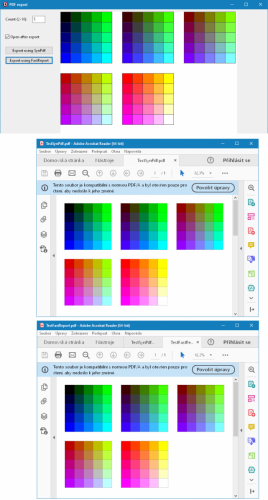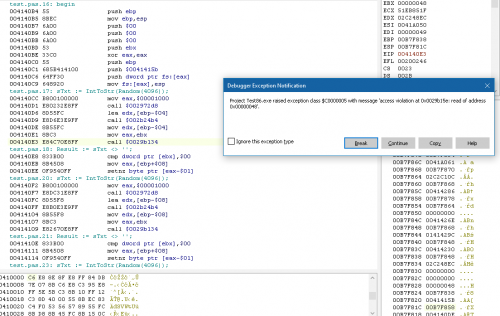-
Content Count
584 -
Joined
-
Last visited
-
Days Won
6
Posts posted by Vandrovnik
-
-
2 hours ago, Attila Kovacs said:Those bitmaps are set up diffeently, like pf32bit / pf24bit who knows what else? Could you check them with the same setup?
Hmm, I forget to put pf24bit back and left pf32bit in the app, but the result is the same with pf24bit and pf32bit.
-
1 hour ago, Brian Evans said:Examining the PDFs I see they store the image using different filters: DCTDecode (fastreport) vs FlateDecode (SynPdf). The first is basically JPEG (larger and often has color shifts in parts) while the second is like ZIP (smaller since the sample is a very uniform image).
Are you comparing colors between PDFs or with the source image?
I do compare both - SynPdf x original bitmap and SynPdf x Fastreport.
Later I tried to open the PDF in another tools (online PDF viewers, MS Edge, Libre Office) and there are colors from TestSynPdf.pdf OK. So may be it is just a bug in Adobe Acrobat Reader?
-
Hello,
I have noticed that in PDF exported using SynPdf, colors in PDF do not match original colors.
I have created a test application, which displays colors on screen and allows to export them to PDF using SynPdf and using FastReport. Colors should be the same, but are not (RGB of the left bottom square should be 191, 0, 255, but is 223, 0, 255 using SynPdf).
Is there something wrong in my export procedure, or is it a bug in SynPdf?
Kind regards,
Karel
-
11 minutes ago, Fr0sT.Brutal said:Just break the string by ":" and then use proper filename functions upon the right part (ExtractFilePath etc)
This will not work with connection string for embedded Firebird.
-
I would suggest to store "server" and "database folder" as separate fileds in your INI.
Server=MySrv:
Dir=C:\MyApp\Data\
It is much easier than to properly split it later. (App installed on another drive than C : , database on linux server, embedded database with empty server name etc.)
-
You can find some inspiration here: https://www.mathsisfun.com/geometry/unit-circle.html
Sin and Cos in Delphi take argument in radians (not in degrees).
-
 1
1
-
-
1 hour ago, Vincent Parrett said:Good luck doing that when your build process runs from a windows service where you are not logged in.
Well, this is not my case, I build locally.
-
10 hours ago, Vincent Parrett said:One thing I would point out is do not get a certificate that is issued on a Yubikey - there is absolutely zero way to automate signing - the yubikey uses the windows smart card api and absolutely prompts on every file you sign!
Where do you have to enter the password - on your computer, or directly on the device? On the computer, we could use AutoHotKey, which would enter the password instead of us 🙂
-
4 minutes ago, David Schwartz said:This was a holdover from CD-ROMs. It's actually a really hairy securitiy risk. You had to go into the ROM-BIOS of the machine and enable a setting to run it, but I'm not sure that even exists any more.
At one point, I was looking at something that did that predictably and found a company in Japan or S. Korea that made thumb drives that registered themselves with Windows as CD-ROM drives, thereby enabling the autorun.inf to be called. I got some demo devices for testing and they worked as advertised, but that project ended up not proceeding. A year or so later I happened to check back with the company and they were no longer selling those devices.
I've been in many places where their IT Dept literally disables the ability to mount any sort of external memory device via USB to their computers. That does not keep you from transferring files, it just makes it a bit more convoluted. (This is where being a Windows programmer comes in handy!)
In my opinion, Autorun.inf is just the ability of Windows to automatically start something from CD, DVD, USB etc.
In BIOS, you can enable booting from CD, DVD or USB drive etc., but it has nothing to do with Autorun.inf.
-
17 hours ago, aleber said:Hello everyone,
we are having problems with Delphi 11.2 on Windows 10. The IDE doesn't crash, but in fact doesn't respond to commands (save, compile, close windows, ...) In the Windows event log we see quite incomprehensible / unhandled .NET errors. We also restored a backup of the entire machine, without success. The only thing that intervenes is the automatic setup (by Windows Update) of "Microsoft 365 Apps for enterprise", "Microsoft Edge", and especially "Microsoft Edge WebView2 Runtime".Has anyone else experienced this problem? Any suggestions on how to solve it (possibly without reinstalling the IDE)?
Thank you,
AB
Hello, after update to Delphi 11.2, it has happened to me a few times (IDE did not respond, so I killed it from Task Manager). Last time it happened when I tried to edit lines between $IFDEF ... $ENDIF.
-
8 minutes ago, Tommi Prami said:Even tough this is very weird example, but seems like something that with some bad luck one could get hit by that.
-Tee-
Exactly... When compiled to Windows-64, it works fine.
-
7 minutes ago, Tommi Prami said:Please report to the Bug Report that you could reproduce it...
Done.
-
 1
1
-
-
17 minutes ago, Attila Kovacs said:@Vandrovnik How get you run that "unit" without touching it?
Just added to existing (command-line) project using menu Project, Add to project.
-
3 hours ago, Attila Kovacs said:Unit1.pas.20: begin 0041A868 55 push ebp 0041A869 8BEC mov ebp,esp 0041A86B 6A00 push $00 0041A86D 6A00 push $00 0041A86F 6A00 push $00 0041A871 53 push ebx 0041A872 8B5D08 mov ebx,[ebp+$08] 0041A875 8B5B0C mov ebx,[ebx+$0c]
ebx is very well initialized
You have probably changed the unit; in my environment, access violation occurs, too.
-
For the "y" direction, there is SM_CYSIZEFRAME.
-
Setting form's Left works fine for me. I have autogenerated manifest, enabled runtime themes and "Per monitor v2" DPI Awarrness.
Instead of setting Left to -7, I set it to minus (GetSystemMetrics(SM_CXSIZEFRAME) + GetSystemMetrics(SM_CXPADDEDBORDER)), which is -8 on my PC.
-
 1
1
-
-
Does the device have 64bit Android? Some devices have 32bit Android and cannot run 64bit apps...
-
40 minutes ago, Fabian1648 said:When the user clicks on the object to be edited, I call an input screen consisting of a display area and keyboard keys. Advantages of the approach: 100% compatible with any Android device and keys big enough to avoid taking a magnifying glass to write something.
But then you should support national keyboards, too? (ie. Czech keyboard has different layout than US keyboard, contains letters like "č" etc.) And what about users, which do prefer their Android virtual keyboard?
-
Just a guess: you may have files from older JCL/JVCL somewhere on your disk and it tries to use them, instead of this new version you want to use?
-
I would use plain tEdit.
-
 1
1
-
-
4 hours ago, Fabian1648 said:Here is my problem:
Why the default TFormatSettings.ShortDateformat displays the year with 4 characters under Windows, but only with 2 characters under Android?
Isn't there a way to notify Android that you want the year with 4 characters instead of 2 without changing the regional settings?
You can still use:
var MyFormat: TFormatSettings; MyFormat:=TFormatSettings.Create; // obtains default settings if pos('yyyy', MyFormat.ShortDateFormat)<=0 then MyFormat.ShortDateFormat:=StringReplace(MyFormat.ShortDateFormat, 'yy', 'yyyy', []); ... DateToStr(now, MyFormat);
-
 1
1
-
-
Would it help, if you use ms.Position := 0; before .LoadFromStream(ms)?
-
On 3/8/2022 at 5:47 PM, Vandrovnik said:Hello,
I am not able to start 1 Android app of 3 apps since migration to Delphi 11.
I did the "Revert system files to default" on Libraries.
I have upgraded to Delphi 11.1. I have deleted folders Android\Debug, Android\Release, Android64\Debug, Android64\Release. Now it works 🙂
-
 1
1
-
-
Hello,
Please is it possible to use Android 12 emulator with Delphi 11.1? When I create and try to run it, I get this message in idea.log: "PANIC: Avd's CPU Architecture 'arm64' is not supported by the QEMU2 emulator on x86_64 host."
Or is there a better way of testing the application with Android 12, but without physical Android 12 device?
Kind regards,
Karel
![Delphi-PRAXiS [en]](https://en.delphipraxis.net/uploads/monthly_2018_12/logo.png.be76d93fcd709295cb24de51900e5888.png)




SynPdf - wrong colors in PDF export
in Delphi Third-Party
Posted
I have created and atteched another output using SynPdf - now I enforced JPG compression of the bitmap, so that it also uses filter DCTDecode. Problem remains, colors do not match.
TestSynPdf-jpg.pdf